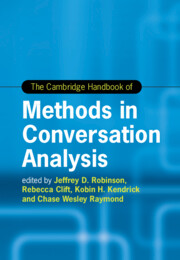Book contents
- Frontmatter
- Contents
- List of Tables
- List of Contributors
- Part I Introduction
- Part II Points of Departure
- Part III Collections
- Part IV Evidence
- 13 Evidencing Conversation-Analytic Claims: How Participants Orient to Social Action
- 14 Evidence for Claims about Interactants’ Sense-Making Processes
- 15 Conversation Analysis as a Comparative Methodology
- 16 The Epistemics of Epistemics: Validating Claims about Epistemic Stance in Conversation Analysis
- 17 Coding and Statistically Associating Inter-Action to Advance Conversation-Analytic Findings
- Part V Avenues into Action
- Part VI Situating and Reporting Findings
- Part VII Looking Forward
- Appendix I Jeffersonian Transcription Conventions
- Appendix II Multimodal Transcription Conventions
- Index
14 - Evidence for Claims about Interactants’ Sense-Making Processes
from Part IV - Evidence
Published online by Cambridge University Press: 06 December 2024
- Frontmatter
- Contents
- List of Tables
- List of Contributors
- Part I Introduction
- Part II Points of Departure
- Part III Collections
- Part IV Evidence
- 13 Evidencing Conversation-Analytic Claims: How Participants Orient to Social Action
- 14 Evidence for Claims about Interactants’ Sense-Making Processes
- 15 Conversation Analysis as a Comparative Methodology
- 16 The Epistemics of Epistemics: Validating Claims about Epistemic Stance in Conversation Analysis
- 17 Coding and Statistically Associating Inter-Action to Advance Conversation-Analytic Findings
- Part V Avenues into Action
- Part VI Situating and Reporting Findings
- Part VII Looking Forward
- Appendix I Jeffersonian Transcription Conventions
- Appendix II Multimodal Transcription Conventions
- Index
Summary
While interaction cannot provide direct evidence for claims about interactants’ expectations, understandings, and reasoning, conversation analysts offer indirect evidence to substantiate claims about interactants’ sense-making processes and activities. This chapter focuses on the kinds of evidence that may be used to substantiate such claims. The chapter discusses the evidence used to support four sense-making claims that Pomerantz made in published papers: (1) participants orient to disagreeing as problematic; (2) participants orient to self-praise as improper or wrong; (3) participants orient to experiencing a referent as a necessary condition for being able to offer one’s own assessment of the referent; and (4) recipients of a report of an inappropriate or unpleasant event may turn their attention to identifying the actions of a person thought to be responsible for the event. Pomerantz assesses whether the evidence she offered for each claim stands up to scrutiny. In addition to discussing the kinds of evidence that may be used to substantiate claims involving sense-making processes, Pomerantz demonstrates that sense-making work is an essential part of interactional practices, she advocates that sense-making processes be included in CA studies of interaction, and she discusses how to describe cognitive matters without making claims that cannot be substantiated.
Keywords
- Type
- Chapter
- Information
- The Cambridge Handbook of Methods in Conversation Analysis , pp. 356 - 385Publisher: Cambridge University PressPrint publication year: 2024

